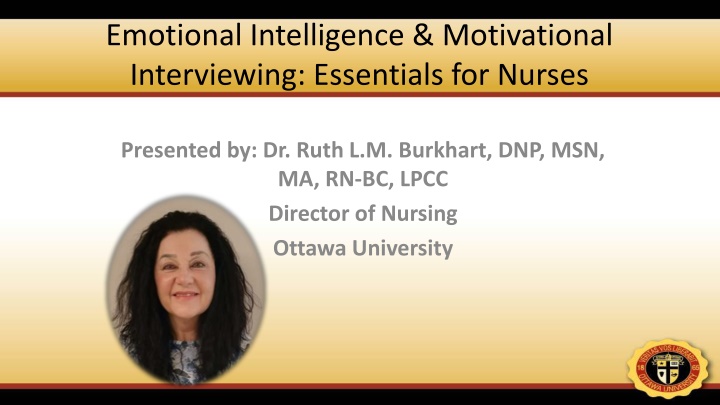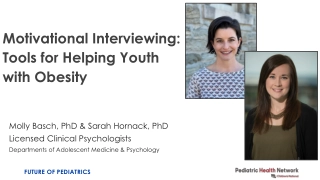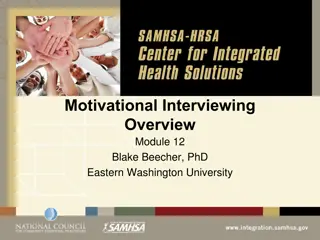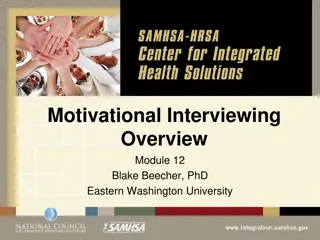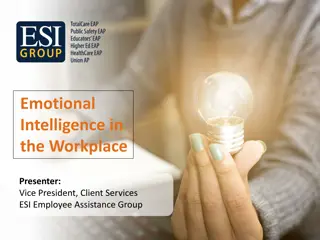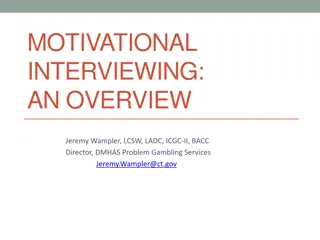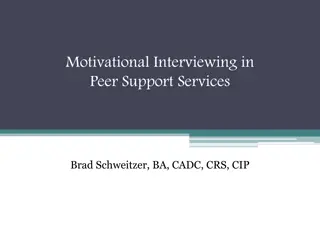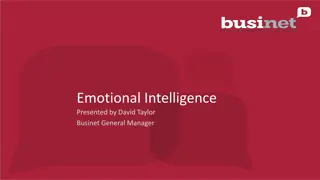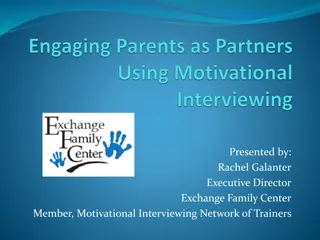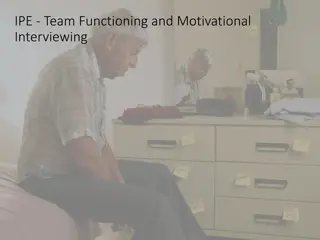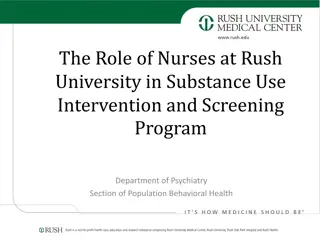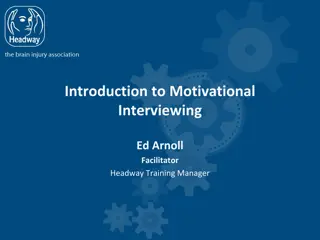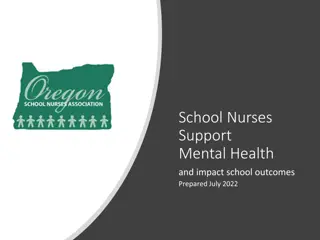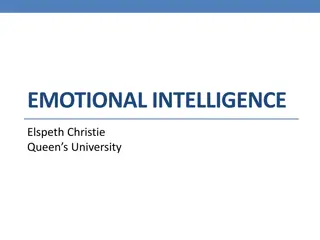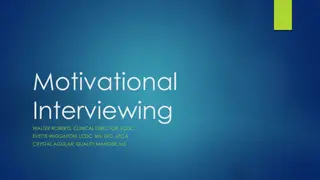Emotional Intelligence & Motivational Interviewing Essentials for Nurses
Explore the essential concepts of Emotional Intelligence (EI) and Motivational Interviewing (MI) in nursing practice. Understand the collaborative and client-centered communication approaches used to address behavior change and ambivalence. Discover the connection between EI and MI for enhancing patient care.
Download Presentation

Please find below an Image/Link to download the presentation.
The content on the website is provided AS IS for your information and personal use only. It may not be sold, licensed, or shared on other websites without obtaining consent from the author.If you encounter any issues during the download, it is possible that the publisher has removed the file from their server.
You are allowed to download the files provided on this website for personal or commercial use, subject to the condition that they are used lawfully. All files are the property of their respective owners.
The content on the website is provided AS IS for your information and personal use only. It may not be sold, licensed, or shared on other websites without obtaining consent from the author.
E N D
Presentation Transcript
Emotional Intelligence & Motivational Interviewing: Essentials for Nurses Presented by: Dr. Ruth L.M. Burkhart, DNP, MSN, MA, RN-BC, LPCC Director of Nursing Ottawa University
Activity Title:Emotional Intelligence & Motivational Interviewing: Essentials for Nurses Activity Date:8/15/2022 - 8/15/2024 Disclosure Action 1. Approval Statement This activity has been submitted to the Arizona Nurses Association for approval to award contact hours. The Arizona Nurses Association is accredited as an approver of nursing continuing professional development by the American Nurses Credentialing Center s Commission on Accreditation. 2. Criteria for Successful Completion an evaluation of the event. 3. Conflicts of Interest Presence or absence of conflicts of interest for all individuals in a position to control content (e.g. the Planning Committee, presenters, faculty, authors, and content reviewers) 4. Commercial Support There is no commercial support being received for this event. 5. Joint Provider(s) if applicableN/A 6.Expiration date for Enduring Materials if applicable Expiration Date: 8/15/2024 Participants must complete a post test at 80% or greater and This educational activity does not include any content that relates to the products and/or services of a commercial interest that would create a conflict of interest. Origination Date: 8/15/2022 Participants: Please note that it should take approximately 150 minutes (2.5 hours) to complete the continuing education offering.
In Case You Were Asking What is Emotional Intelligence (EI)? What is Motivational Interviewing (MI)? And What is the Connection Between the Two? .. Let s start with an Overview of Motivational Interviewing
Motivational Interviewing a Snapshot A facilitative, collaborative, yet focused therapeutic communication style directed at identifying and addressing ambivalence about behavior change Respecting client autonomy and choice is central The skill set employed in MI is client centered, conversational communication, but is intentional MI is not directing or demanding a change, but instead influencing choice through the use of four communication techniques (Droppa & Lee, 2014; Rollnick & Miller, 1995; Shannon, Smith, & Gregory, 2003)
Why MI? BohoJack Press (2019). My mind is like my internet browser 19 tabs open 3 of them are frozen and I have no idea where the music is coming from. https://books.google.com/books/about/My_Mind_Is_Like_My_Internet_Browser_19_T.html?id=wCZjzQEACAAJ
Why MI? Nurses have a Key Role in Health Promotion Effective Health Promotion Requires Effective Communication Skill (Droppa & Lee, 2014) . To engage the client . To facilitate clarity of health issues(s) . To identify client s priorities & goals . To lead the client toward contemplation of change The previous Meme Captures the Why!
MI & The Stages of Change Transtheoretical Model (TTM) Pre-contemplation .. None or minimal awareness of need for change Contemplation .. Awareness of problem, but uncertainty regarding need to change Preparation .. Awareness of need to change, Specific plan needed to succeed Action .. Ready to accept help, Change happens Maintenance (Raihan, & Cogburn, 2022) .. Change continues, Able to successfully manage triggers
The Connection: MI & TTM MI Techniques Facilitate the Development of Intrinsic Motivation for Change MI is built on Individuals being at Different Stages of Awareness and Motivation for Change Utilizing the TTM Model Provides a Model for Level or Stage of Readiness to Accept and Work toward Change (Oxford Treatment Center, 2022; Rollnick & Miller, 2012)
Motivational Interviewing: the Four Techniques Engaging ..Build rapport, reduce potential for defensiveness .. Active & reflective listening Focusing .. Work with client to identify and clarify direction and goal Evoking .. Build on and guide client s motivation toward change; Change Talk Planning .. Foster commitment to change & build of specific plan (State of Colorado. Division of Criminal Justice, n.d.).
Engaging Dos Work toward making client comfortable to discuss change Assess own comfortability with client and process Understand client s perspective Use empathy if resistance or discord occurs Goals for Engaging Process Relationship and rapport building Comfort Safety Empathy (State of Colorado. Division of Criminal Justice, n.d.)
Focusing Dos Monitor readiness for change (Stages of Change) It s all about the target behavior Focal point is a clear, relevant target behavior, and identifying barriers to change Avoid the premature focus trap Goals for Focusing Process Ensure the goals & target behavior are client s Ensure a collaborative process with the client (State of Colorado. Division of Criminal Justice, n.d.).
Evoking Dos Identify clearly client s reasons for change & change talk Identify clearly the why of reluctance to change (confidence in making change vs importance of change?) Monitor timing & one s need to take charge Goals for Evoking Process Elicit, increase, & sustain change talk Evoke & nurture internal motivation for change Avoid the righting reflex (State of Colorado. Division of Criminal Justice, n.d.).
Planning Dos Timing & readiness to proceed are key Must have sufficient client engagement & identified shared goal for developing goal specifics, options, plans, and supports Summarize journey from Evoking to Planning processes Goals for Planning Process Skill development Plan for action Review & remove barriers to change Develop resources for ongoing support (State of Colorado. Division of Criminal Justice, n.d.).
EI: The ScoopResiliency, Communication, & Self-Efficacy EI (emotional intelligence) - Sum Total of the Unique Personal How" of Interacting with Others (Goleman, 1995) EI - Learned Skill in Self Other Awareness, Managing Oneself & Emotions in Relation to Others Emotional Intelligence (EI) Builds Resiliency .. EI Self-awareness, Effective Management of Emotions, Effective use of Communications .. EI Promotes Adaptability (Brown & Kafka, 2020; Cahill, Beadle, Farrelly, Forster, & Smith, 2012; The Highly Effective Teacher, 2021) .. EI Helps Prevent Misinterpretation & Misunderstanding of Events, Builds Self-Efficacy & Self- Advocacy Promoting Relationship Skills and Need Meeting (MacCann, 2020)
The Emotional Intelligence (EI) factor in MI Skill Emotions are Essential for Competent Nursing Practice as Nursing Involves Relationships of Caring Effective use of Emotions and Cognition are Essential in Relationship Competency, Communication, & Decision-making (Smith, Cummings, & Profetto-McGrath, 2009) EI increases capacity to effectively perceive, assess, and express emotion, understand, process, and respond to information with emotional coding, and regulate emotions in a productive way (Mayer & Salovey,1997) Effective use of MI tools requires engagement and effective use of relationship skills
EI/MI & Nursing The Fit Nurse Health Promotion and Patient Education Role MI) The Nurse Self-Management Role (EI) Both EI & MI Facilitate Effective Communication Effective use of MI Requires EI Training for Nurses First Step of Improving EI is Awareness MI requires Self & Other Awareness in real time Free Online EI information & quiz via website below Craig, H. (2019). 17 Emotional Intelligence Tests and Assessments. https://positivepsychology.com/emotional-intelligence-tests/
The Four Quadrants of EI Self-awareness - awareness of, and accurate perception of, emotions in real time Self-management ability to use awareness and perception of emotions to be flexible and respond effectively Social-awareness ability to perceive and understand other s emotions accurately Relationship management ability to effectively manage self and others in social interactions (Riopel, 2019)
EI Training Components of EI training .. Identify strengths & weaknesses, ways to improve .. Build self-awareness by tuning in to feelings | of discomfort, anxiety, upset .. Find a self-alert tool to slow it down and take a time-out to process .. Identify antecedents and triggers to discomfort .. Identify nature of discomfort .. Increase awareness of expectations of self/others ( (DePaul University, n.d.) D
EI Training Identify areas for potential give and take Identify resistance/barriers to being flexible Tune in to others . Improve listening skills Practice active listening look beyond words In high emotion situations, go slow , actively listen, use therapeutic communication skills, ie reflection, emotion labeling, open-ended questions, I-statements Use verbal pauses (DePaul University, n.d.)
Your MI Toolkit: Growing Your EI 6 Steps to Improve Your Emotional Intelligence 1) Acknowledge & Value Emotions Have an inquiring mind ask others how they are feeling & listen to their responses Respond honestly when asked how you are feeling, using I messages Talk about emotions, build tolerance to feeling emotions and talking about them 2) Differentiate & Analyze Emotions Get to the core emotion Use I messages to reflect how you really feel, ie. instead of saying that person doesn t know what they are talking about , say I m very (frustrated)(disappointed) etc about what was said/done Hacker, R. (2018, February). 6 steps to improve your emotional intelligence [Video]. TED x TUM. https://www.youtube.com/watch?v=D6_J7FfgWVc
Your MI Toolkit: Growing Your EI 6 Steps to Improve Your Emotional Intelligence 3) Accept & Appreciate Emotions External influences assign value to emotions, in essence they are nether good or bad For example sadness this emotion is simply the reflection of love we had for someone or something now lost to us Emotions journal to write in as needed or Emotions App on phone for recording 4) Reflect on Emotions and their Origins Writing them down, talking about emotions facilitates understanding and effective processing Hacker, R. (2018, February). 6 steps to improve your emotional intelligence [Video]. TED x TUM. https://www.youtube.com/watch?v=D6_J7FfgWVc
Your MI Toolkit: Growing Your EI 6 Steps to Improve Your Emotional Intelligence 5) Handling Your Emotions Read about how to effectively manage emotions Ask others Role model from others whom you perceive manage emotions effectively 6) Handling the Emotions of Others Understanding and awareness are the keys! Ask others how you might best support them Hacker, R. (2018, February). 6 steps to improve your emotional intelligence [Video]. TED x TUM. https://www.youtube.com/watch?v=D6_J7FfgWVc
Learn New Skills Incompetence Conscious Incompetence Conscious Competence Unconscious Competence Mastery (2nd Nature) (Hacker, 2018)
My EI MI Growth Plan How Will I . . Become more self aware? More aware of emotions? . Become more comfortable with negative emotions? . Slow it down when feeling negative emotions? . Own emotions, reactions, actions as part of self? . Reduce reactivity, respond instead of react? . Express negative emotions .. Assertively? . Take criticism without withdrawing, without over- reacting? . Get the mad out in a way that causes no loss of face? . Empathize when feeling negative emotion for someone?
My EI-MI Growth Plan How will I become more aware of how I present to others? How will I become more aware of how my affect/mood/choice of words and style of communication affect others? How can I become more flexible, tolerant without compromising my values? How can I become more proficient in active listening skills? How can I avoid rescuing, giving advice, giving in to the righting reflex when communicating with others? How can I become more skillful in the focused going with MI technique? How will I use MI tools in my nursing practice?
Post-test Survey Link Please complete the Post-test for the Emotional Intelligence & Motivational Interviewing: Essentials for Nurses CNE at the Survey Planet link below, and upon completion, proceed to the next slide for Evaluation Survey instructions: https://s.surveyplanet.com/99ux3sgt
Evaluation Survey Link Please complete the Evaluation Survey for Emotional Intelligence & Motivational Interviewing: Essentials for Nurses CNE at the SurveyPlanet link below: https://s.surveyplanet.com/8cgd3q1x
References Ackerman, C.E. (2018). How to improve emotional intelligence in the workplace. https://positivepsychology.com/emotional-intelligence-workplace/ BohoJack Press (2019). My mind is like my internet browser 19 tabs open 3 of them are frozen and I have no idea where the music is coming from. https://books.google.com/books/about/My_Mind_Is_Like_My_Internet_Browser_19_T.html?id=wCZjzQE ACAAJ Brown, S., & Kafka, A. (2020, July 2023). Covid-19 has worsened the student mental-health crisis. Can resilience training fix it? https://www.chronicle.com/article/covid-19-has-worsened-the-student-mental- health-crisis-can-resilience-training-fix-it/ Cahill, H., Beadle, S., Farrelly, A., Forster, R., and Smith, K. (2012). Building resilience in children and young people. https://www.education.vic.gov.au/Documents/about/department/resiliencelitreview.pdf Craig, H. (2019). 17 Emotional Intelligence Tests and Assessments. https://positivepsychology.com/emotional-intelligence-tests/ DePaul University (n.d.). Emotional intelligence in the workplace. https://snlapps.depaul.edu/writing/Emotional%20Intelligence%20Training%20Manual.pdf Droppa, M., & Lee, H. (2014). Motivational interviewing: A journey to improve health. Nursing 2014, 44(3), 40-45. Goleman, D. (1995). Emotional intelligence. Bantam Books, New York. Good Therapy (2022). Emotional Intelligence test | Online EQ test (free and paid). https://www.goodtherapy.org/tests/emotional-intelligence.html
References Hacker, R. (2018, February). 6 steps to improve your emotional intelligence [Video]. TED x TUM. https://www.youtube.com/watch?v=D6_J7FfgWVc MacCann, C. (2020). Why you need emotional intelligence to succeed at school. https://www.psychologytoday.com/us/blog/dealing-emotions/202006/why-you-need-emotional- intelligence-succeed-school Mayer, J.D., Salovey, P. (1997). What is emotional intelligence? In: Salovey, P., Sluyter, D.J. (Eds.), What is Emotional Intelligence? Basic Books, New York Raihan, N., & Cogburn, M. (2022, update). Stages of change. Stat Pearls. https://www.ncbi.nlm.nih.gov/books/NBK556005/ Riopel, L. (2019). Emotional intelligence framework, charts, diagrams, and graphs. https://positivepsychology.com/emotional-intelligence-frameworks/ Rollnick, S., Miller, & W. R. (1995). What is Motivational Interviewing?". Behavioural and Cognitive Psychotherapy, 23(4),325-334. Shannon, S, Smith, V. J., & Gregory, J.W. (2003). A pilot study of motivational interviewing in adolescents with diabetes. Archives of Disease in Childhood, 88(8), 680-683. Smith, K.B., Cummings, G.G., & Profetto-McGrath (2009). Emotional intelligence and nursing: An integrative review. International Journal of Nursing Studies, 46, 1624-1636. State of Colorado. Division of Criminal Justice (n.d.). The 4 processes of MI. https://cdpsdocs.state.co.us/epic/epicwebsite/resources/mi_communities_of_practice/4_processes/4_pr ocesses.pdf
References The Highly Effective Teacher. (2021). Is resilience the key to student success? https://thehighlyeffectiveteacher.com/how-to- promote-resilience-in-your-students/
Instructions for CNE Certificate Your certificate will be emailed to you upon completion of the post test and evaluation Thank you for participating! We wish you the very best
